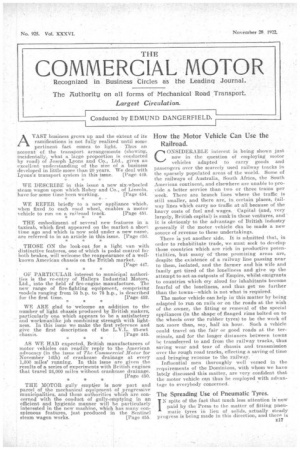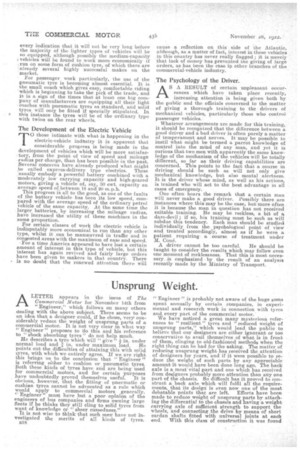How the Motor Vehicle Can Use the Railroad.
Page 1

Page 2

If you've noticed an error in this article please click here to report it so we can fix it.
CONSIDERABLE interest is being shown just new in the question of :employing motor vehicles adapted to carry goods and passengers over the scarcely used railway tracks in
the sparsely populated areas of the world. Some of the railways of Australia, South Africa, the South American continent, and elsewhere are unable to pro yide a better service than two or three trains per week. There are branch lines where the traffic is
still smaller, and there are; in certain places, tailway lines which carry no traffic at all because of the heavy costs of fuel and wages. Capital (and, very largely, British capital) is sunk in these ventures, and it is obviously te, the advantage of British industry generally if the motor vehicle c'an be made a new source of revenue to these undertakings.
There is yet another side. It is admitted that, in order to rehabilitate trade, we must seek to develop those countries which are rich in productive poten tialities, but many of 'these promising areas are, despite the existence of a railway line passing near to them, isolated, and the farmer and his wife and family get tired of the loneliness and give up the attempt to act as outposts of Empire, whilst emigrants to countries which cry aloud for inhabitants become fearful of the loneliness, and thus get no further than the towns—which is not what is required.
The motor vehicle can help in this matter by being adapted to run on rails or on the roads at the wish
of the owner, the fitting or removal. of the special
appliances (in the shape of flanged rims bolted on. to the wheels over the rubber tyres) to be the work of not more than, say, half an hour. Such a vehicle could travel on the fair or good roads at the terminals, and for the longer distances between towns he transferred to 'and from the railway tracks, thus saving wear and tear of chassis and transmission over the rough road tracks, effecting a saving of time and bringing revenue to the railway. ' Influential men thoroughly well versed in the requirements of the Dominions, with whom we have lately discussed this matter, are. very ccinfident that the motor vehicle can thus be employed with advantage to everybody concerned.
The Spreading Use of Pneumatic Tyres.
IN spite of the fact that Much less attention is'now paid by the Press to the matter of fitting pneumatic tyres in lieu, of solids, actually steady progress is being made in this direction, and there is every indication that it will not be very long before the majority of the lighter types of vehicles will be so equipped, although possibly the medium-capacity 'vehicles will be found to work more economically if i run on some form of cushion tyre, of which there are
• already several highly successful makes on the market.
For passenger work particularly, the use of the pneumatic tyre is becoming almost essential. It is the small coach which gives easy, comfortable riding which is beginning to take the pick of the trade, and it is a sign of the times that at least one big cornpany of manufacturers are equipping all their light
• coaches with pneumatic tyres as standard, arid solid tyres will only be fitted if specially stipulated. In a this instance the tyres will be of the ordinary type with twins on the rear wheels.
The Development of the Electric Vehicle
T0 those intimate with what is happening in the electric-vehicle indttstry it is apparent that considerable progress is being made in the development of vehicles which will be more satisfac.tory, from the point of view of speed and mileage radius per charge, than has been possible in the past Several concerns have already produced what might be called express-delivery type electrics. These .usually embody a powerful battery combined with a moderately low carrying capacity • and high-geared motors, giving a vehicle of, say, 30 cwt. capacity an average speed of,between 18 and 20 m.p.h..
This progress is all to the good, as one of the faults of the battery vehicle has been its low speed, compared with the average speed of the ordinary petrol vehicle of the same capacity. At the same time the • larger batteries, by increasing the mileage radius, have increased the utility of these machines in the same proportion.
.For certain classes of work the electric vehicle is indisputably more economical to run than any other type, whilst it can be manceuvred in traffic and in congested areas with the maximum of ease and speed. -For a time America appeared to have lost a certain amount of interest in this type of vehicle, but this interest has again revived and fairly large orders have been given to makers in that country. There Is no doubt that the renewed attention there wiil
cause a reflection on this side of the Atlantic, although, as a matter of fact, interest in these vehicles in this country has never really flagged ; it is merely that lack of money has prevented the giving of large orders, as has been the case in other branches of the commercial-vehicle industry.
The Psychology of the Driver.
AS A RESULT of certain unpleasant occurrences which have taken place recently, increasing attention is being given both by the public and the officials concerned to the matter of giving a thorough training to the drivers of mechanical vehicles, particularly those who control
passenger vehicles. '
Whatever arrangements are made for this training, it should be recognized that the difference between a good driver and a bad driver is often purely a matter of temperament and nerves. it may be possible to instil what might be termed a parrot knowledge of control into the mind of any man, and yet it is curious that two men with apparently the same knowledge of the mechanism of the vehicles will be totally different, so far as their driving capabilities are concerned. This points to the fact that a course in driving should be such as will not only give mechanical knowledge, but also mental alertness. It is the driver whose mind, as well as his actions, is trained who will act to the best advantage in all cases of emergency.
One often hears the remark that a certain man will never make a good driver. Possibly there are instances where this may be the case, but more often it is because the man in question has not received suitable training. He may be reckless, a bit of A dare-devil ; if so, his training must be such as will subdue this tendency. Each man should be studied individually from the psychological point of view and treated accordingly, almost as if he were a patient requiring a course of treatment under M. Cou4.
A driver cannot be the careful. He should be taught to consider the results which may follow even one moment of recklessness. That this is most necessary is emphasized • by the result of an analysis recently made by the Ministry Of Transport.




























